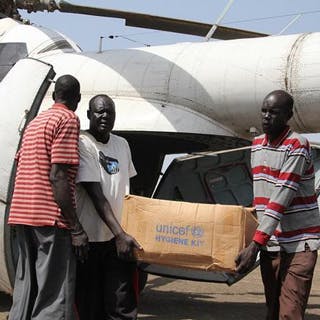“You see the sense of hope despite the hunger and the horrors,” said James Elder, who has been on the ground in South Sudan as part of the humanitarian response effort of the United Nations Children’s Fund (UNICEF).
Since conflict erupted in December, more than 1 million people have fled their homes, including more than 380,000 children. The challenges in the world’s newest nation are daunting: Severe malnutrition; measles outbreaks; the looting and destruction of health facilities; and the difficulty of getting aid to people in remote areas because of lack of security and infrastructure.
Despite these challenges, Elder has been struck by the hope, optimism, and determination of the citizens of South Sudan.
He told me about a 13-year-old girl who saw her mother killed and fled the violence in her village to the town of Akobo, near the Ethiopian border. The residents of Akobo have opened their doors to this girl and other displaced citizens – working to locate relatives of the girl and sharing what food they have, even though flooding last year destroyed many of their crops.
UN agencies have launched a massive operation to provide life-saving aid to South Sudanese who have escaped to remote locations and are in dire need of relief.
- WFP and UNICEF plan to do more than a dozen of these drops in the coming weeks with the aim of reaching as many as 250,000 in the Jonglei, Upper Nile, and Unity states.
- The World Health Organization is working with non-governmental groups in South Sudan to expand access to health services to rural areas.
How You Can Help
There are a number of ways people can help, says Elder:
“We need people to be aware, and not just think that it’s another crisis that no one can do anything about. By all means, what we need first and foremost is a political resolution. So it’s general awareness of the situation and pressure.
“In the immediate time we require funds. UNICEF and partners are very clear on what needs to be done, whether it’s for those people around the crowded camps or whether it’s for the hundreds of thousands who are in remote areas, stuck, isolated, and in desperate need of the most basic humanitarian supplies. Our job is to get it to them. But we can’t do that without money.”
To date, the UN’s South Sudan Crisis Response Plan has only received 25% of the funds it’s requested.
YOU can help: To support UNICEF’s work in South Sudan, visit unicef.org. To support WFP’s work, visit wfp.org.
photo credit: James Elder/UNICEF



 View All Blog Posts
View All Blog Posts